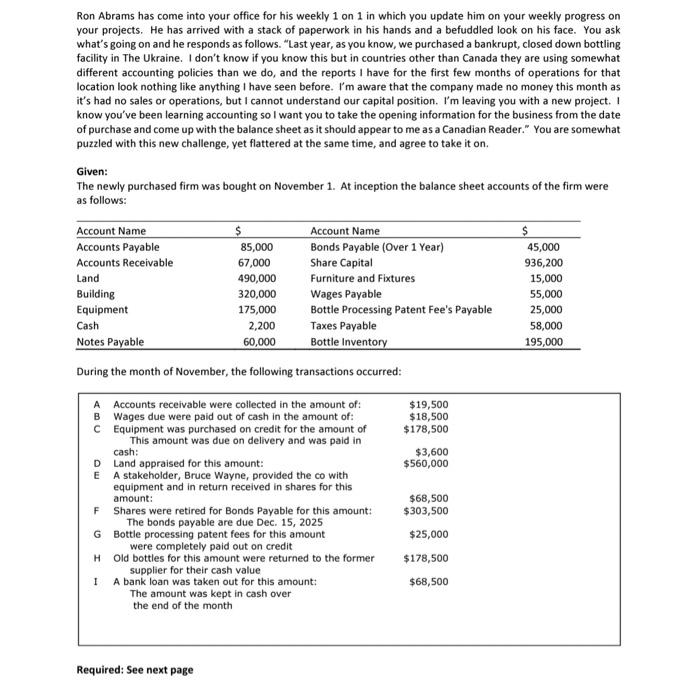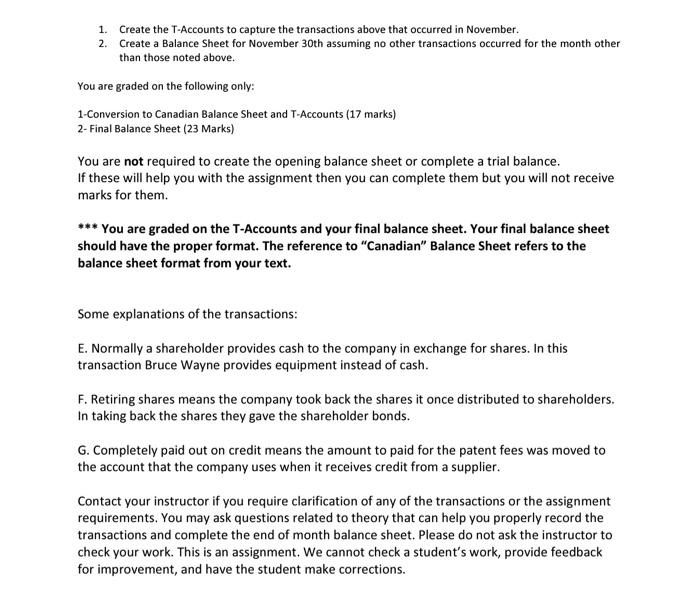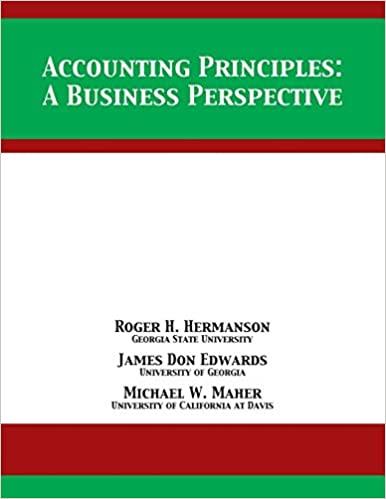Ron Abrams has come into your office for his weekly 1 on 1 in which you update him on your weekly progress on your projects. He has arrived with a stack of paperwork in his hands and a befuddled look on his face. You ask what's going on and he responds as follows. "Last year, as you know, we purchased a bankrupt, closed down bottling facility in The Ukraine. I don't know if you know this but in countries other than Canada they are using somewhat different accounting policies than we do, and the reports I have for the first few months of operations for that location look nothing like anything I have seen before. I'm aware that the company made no money this month as it's had no sales or operations, but I cannot understand our capital position. I'm leaving you with a new project. I know you've been learning accounting so I want you to take the opening information for the business from the date of purchase and come up with the balance sheet as it should appear to me as a Canadian Reader." You are somewhat puzzled with this new challenge, yet flattered at the same time, and agree to take it on.
Ron Abrams has come into your office for his weekly 1 on 1 in which you update him on your weekly progress on your projects. He has arrived with a stack of paperwork in his hands and a befuddled look on his face. You ask what's going on and he responds as follows. "Last year, as you know, we purchased a bankrupt, closed down bottling facility in The Ukraine. I don't know if you know this but in countries other than Canada they are using somewhat different accounting policies than we do, and the reports I have for the first few months of operations for that location look nothing like anything I have seen before. I'm aware that the company made no money this month as it's had no sales or operations, but I cannot understand our capital position. I'm leaving you with a new project. I know you've been learning accounting so I want you to take the opening information for the business from the date of purchase and come up with the balance sheet as it should appear to me as a Canadian Reader." You are somewhat puzzled with this new challenge, yet flattered at the same time, and agree to take it on. Given: The newly purchased firm was bought on November 1 . At inception the balance sheet accounts of the firm were as follows: During the month of November, the following transactions occurred: Required: See next page 1. Create the T-Accounts to capture the transactions above that occurred in November. 2. Create a Balance Sheet for November 30th assuming no other transactions occurred for the month other than those noted above. You are graded on the following only: 1-Conversion to Canadian Balance Sheet and T-Accounts (17 marks) 2-Final Balance Sheet (23 Marks) You are not required to create the opening balance sheet or complete a trial balance. If these will help you with the assignment then you can complete them but you will not receive marks for them. You are graded on the T-Accounts and your final balance sheet. Your final balance sheet should have the proper format. The reference to "Canadian" Balance Sheet refers to the balance sheet format from your text. Some explanations of the transactions: E. Normally a shareholder provides cash to the company in exchange for shares. In this transaction Bruce Wayne provides equipment instead of cash. F. Retiring shares means the company took back the shares it once distributed to shareholders. In taking back the shares they gave the shareholder bonds. G. Completely paid out on credit means the amount to paid for the patent fees was moved to the account that the company uses when it receives credit from a supplier. Contact your instructor if you require clarification of any of the transactions or the assignment requirements. You may ask questions related to theory that can help you properly record the transactions and complete the end of month balance sheet. Please do not ask the instructor to check your work. This is an assignment. We cannot check a student's work, provide feedback for improvement, and have the student make corrections. Ron Abrams has come into your office for his weekly 1 on 1 in which you update him on your weekly progress on your projects. He has arrived with a stack of paperwork in his hands and a befuddled look on his face. You ask what's going on and he responds as follows. "Last year, as you know, we purchased a bankrupt, closed down bottling facility in The Ukraine. I don't know if you know this but in countries other than Canada they are using somewhat different accounting policies than we do, and the reports I have for the first few months of operations for that location look nothing like anything I have seen before. I'm aware that the company made no money this month as it's had no sales or operations, but I cannot understand our capital position. I'm leaving you with a new project. I know you've been learning accounting so I want you to take the opening information for the business from the date of purchase and come up with the balance sheet as it should appear to me as a Canadian Reader." You are somewhat puzzled with this new challenge, yet flattered at the same time, and agree to take it on. Given: The newly purchased firm was bought on November 1 . At inception the balance sheet accounts of the firm were as follows: During the month of November, the following transactions occurred: Required: See next page 1. Create the T-Accounts to capture the transactions above that occurred in November. 2. Create a Balance Sheet for November 30th assuming no other transactions occurred for the month other than those noted above. You are graded on the following only: 1-Conversion to Canadian Balance Sheet and T-Accounts (17 marks) 2-Final Balance Sheet (23 Marks) You are not required to create the opening balance sheet or complete a trial balance. If these will help you with the assignment then you can complete them but you will not receive marks for them. You are graded on the T-Accounts and your final balance sheet. Your final balance sheet should have the proper format. The reference to "Canadian" Balance Sheet refers to the balance sheet format from your text. Some explanations of the transactions: E. Normally a shareholder provides cash to the company in exchange for shares. In this transaction Bruce Wayne provides equipment instead of cash. F. Retiring shares means the company took back the shares it once distributed to shareholders. In taking back the shares they gave the shareholder bonds. G. Completely paid out on credit means the amount to paid for the patent fees was moved to the account that the company uses when it receives credit from a supplier. Contact your instructor if you require clarification of any of the transactions or the assignment requirements. You may ask questions related to theory that can help you properly record the transactions and complete the end of month balance sheet. Please do not ask the instructor to check your work. This is an assignment. We cannot check a student's work, provide feedback for improvement, and have the student make corrections








